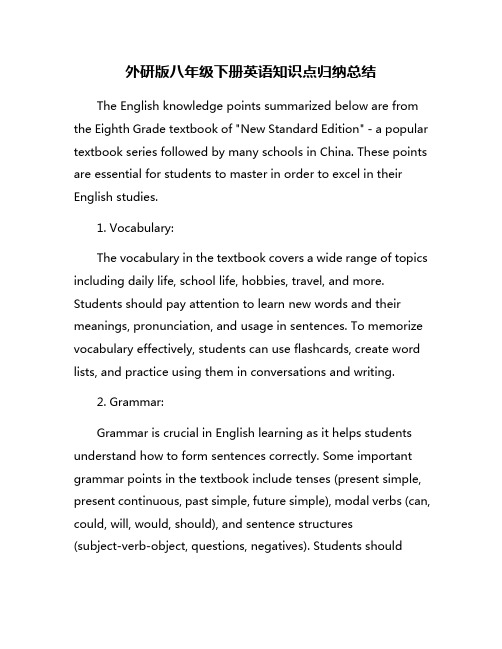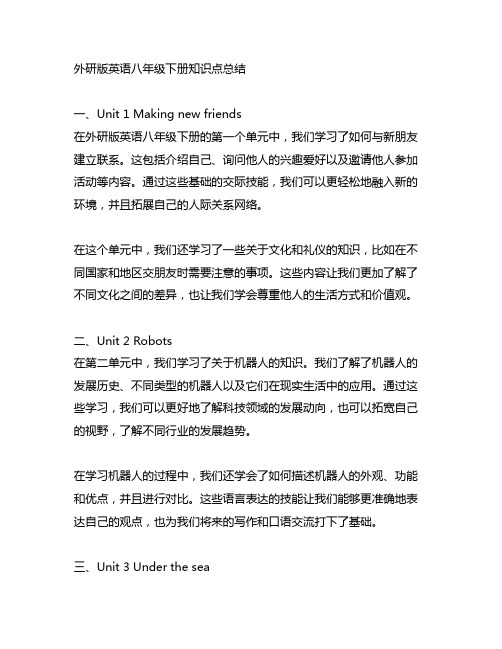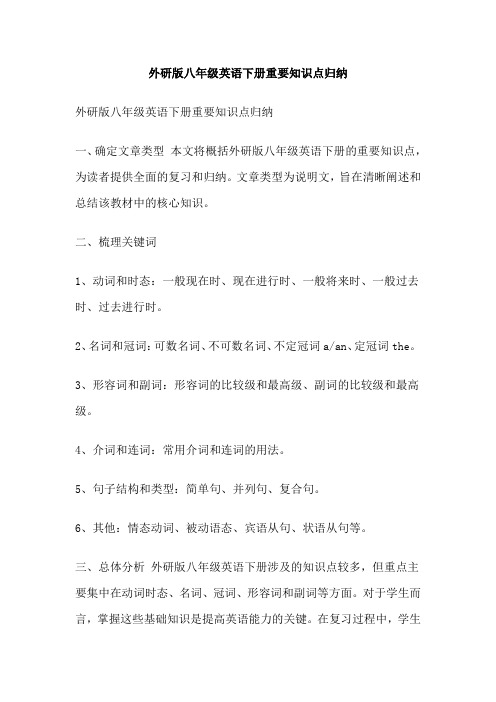八年级下英语 外研版 全部知识点总复习
外研版八年级下册英语知识点归纳总结

外研版八年级下册英语知识点归纳总结The English knowledge points summarized below are from the Eighth Grade textbook of "New Standard Edition" - a popular textbook series followed by many schools in China. These points are essential for students to master in order to excel in their English studies.1. Vocabulary:The vocabulary in the textbook covers a wide range of topics including daily life, school life, hobbies, travel, and more. Students should pay attention to learn new words and their meanings, pronunciation, and usage in sentences. To memorize vocabulary effectively, students can use flashcards, create word lists, and practice using them in conversations and writing.2. Grammar:Grammar is crucial in English learning as it helps students understand how to form sentences correctly. Some important grammar points in the textbook include tenses (present simple, present continuous, past simple, future simple), modal verbs (can, could, will, would, should), and sentence structures(subject-verb-object, questions, negatives). Students shouldpractice using these grammar points in different contexts to enhance their language proficiency.3. Reading Comprehension:Reading comprehension exercises in the textbook are designed to test students' understanding of the text, vocabulary, and grammar. Students should practice reading passages carefully, underline key information, and answer comprehension questions accurately. They can also improve their reading skills by summarizing the main ideas, making predictions, and inferring meanings from context.4. Listening Comprehension:Listening comprehension exercises help students understand spoken English in different accents and contexts. Students should listen to the audio recordings attentively, take notes of key information, and answer questions based on the content. To improve listening skills, students can practice listening to English podcasts, music, and movies regularly.5. Speaking:Speaking activities in the textbook focus on developing students' oral communication skills in English. Students should practice speaking fluently, clearly, and confidently byparticipating in classroom discussions, role-plays, debates, and presentations. Practicing pronunciation, intonation, and speaking speed can help students improve their spoken English proficiency.6. Writing:Writing exercises in the textbook aim to enhance students' writing skills in English. Students should practice writing different types of texts including essays, letters, emails, and reports. They should pay attention to grammar, vocabulary, organization, and coherence in their writing. Feedback from teachers and peers can help students improve their writing skills effectively.In conclusion, mastering these English knowledge points is essential for students to achieve success in their English studies. By focusing on vocabulary, grammar, reading comprehension, listening comprehension, speaking, and writing, students can enhance their English language skills and excel in their academic performance. Practice, perseverance, and dedication are key to becoming fluent and proficient in English.。
外研版英语八年级下册知识点总结

外研版英语八年级下册知识点总结一、Unit 1 Making new friends在外研版英语八年级下册的第一个单元中,我们学习了如何与新朋友建立联系。
这包括介绍自己、询问他人的兴趣爱好以及邀请他人参加活动等内容。
通过这些基础的交际技能,我们可以更轻松地融入新的环境,并且拓展自己的人际关系网络。
在这个单元中,我们还学习了一些关于文化和礼仪的知识,比如在不同国家和地区交朋友时需要注意的事项。
这些内容让我们更加了解了不同文化之间的差异,也让我们学会尊重他人的生活方式和价值观。
二、Unit 2 Robots在第二单元中,我们学习了关于机器人的知识。
我们了解了机器人的发展历史、不同类型的机器人以及它们在现实生活中的应用。
通过这些学习,我们可以更好地了解科技领域的发展动向,也可以拓宽自己的视野,了解不同行业的发展趋势。
在学习机器人的过程中,我们还学会了如何描述机器人的外观、功能和优点,并且进行对比。
这些语言表达的技能让我们能够更准确地表达自己的观点,也为我们将来的写作和口语交流打下了基础。
三、Unit 3 Under the sea第三单元让我们深入了解了海洋生物的知识,比如不同种类的鱼类、海洋植物、以及生活在海洋里的各种生物。
通过学习这些内容,我们可以更好地认识到保护海洋环境的重要性,也让我们了解了自然界的神奇与多样性。
我们在这个单元中也学会了如何描述海底世界的景象,并且学会了使用形容词和副词来增加句子的丰富度。
这些技能对于我们的写作和口语表达都非常重要,可以让我们的语言更加生动和精彩。
四、Unit 4 Wild animals在这个单元,我们学习了如何描述野生动物、它们的特点及栖息环境。
通过对野生动物的了解,我们可以更好地保护和珍惜自然资源,也可以更深入地了解动物世界的精彩之处。
我们还学会了如何表达对动物的喜爱和保护之情,如何呼吁他人一起来保护野生动物。
这些内容培养了我们的社会责任感和环保意识,也让我们学会用语言来表达自己的观点和态度。
外研版八年级英语下册重要知识点归纳

八年级下册英语重要知识点归纳M1 重要语法: 感官性系统词: feel(摸起来)、look(看起来) 、smell(闻起来) 、 taste( 尝起来 ) sound(听起来),后接形容词作表语,不能接副词。
构成疑问句或否定句 要借助助动词。
The silk dress feels soft. The flowers look very beautiful. Does it smell nice? The doesn’t be noisy. o .ng se iucniodus 多么香啊! a 对名词s l l 词!短语感叹用 what感叹句结构: ①What+ 形容词+单数可数名词+ (主语+谓语)! /h nt + ②i Wthat+形容词+不可数名词/复数名词+ (主语+谓语)!WhatWto a g!ood stud ents they are!对形容词、 副词或动词感叹用 how③ 形容词/副词+主语+谓语!H wuonwn i ne ciousHow d smells! 我多么怀念我们一起度过的日子!3.I’mspent 句子:恐怕 …… I’m he has no time today. f .raid ne 做好了 Is afraid one?你的作业做好了吗? d Dhi e rworkone!晚饭做好了!5. have a try 试一;尝一尝6.have 喜好甜食 o .toht nks 名词/动词-ing 。
因 ……而感谢你。
ohra+n ksl gy ou for inviting me to your party. letter from … 收到 …… 的来信 r .ceacne’itv e t 1o 0.人+ sth. d sth. He spent two days (in) reading the novel. =It took him two days to read the novel.11.too 也(置于句末,前加逗号) also 也(置于居中 be 或情态动词之后) as 也(置于句末,前不加逗号)12e ll 以 …… 为豪 My f 3…. H ow do you feel about+ f 词/动词-ing ? =What d o you think of+ 名词/动词 -ing ?你觉得 …… 怎么样? How o o d How ilm?=What the o1 . beChina?=W h t 词/动词-ing :害怕 … . to dog/goingboef + oing a aid 害怕做某n 事ig ht.of to sth.o 迫不及待去做某事 I can’t wait to see you. s 时th 间. (in) doing 。
新外研版八年级英语(下册)重点知识点总结

外研版八年级英语下册重点知识点Module1语法:系动词:一是(be:am,is,are,been,was,were),一觉得(feel),一好像(seem),一保持(keep),三变化(turn,become,get),四起来(smell,sound,look,taste),后跟形容词..11.三到达:arriveat(小地方),arrivein(大地方),getto=reach注意:跟home,here,there等副词时,不加介词.12.quite相当,很,相当于very,区别,quitea../quitean..而very只能放在a/an后13.with有,带有;和…一起;使用等.反义词without14.lovely:令人愉快的,可爱的修饰人或物alovelyafternoon/girllively:活泼的,生动的alivelylesson:一堂生动的课16.四个花费:take:Ittakessb.sometimetodosth./Ittooksb.sometimetodosth.Spend:Sb.spendsometime/moneyonsthSb.spendsometime/money(in)doingsth.Pay:Sb.paysomemoneyforsth.cost:sthcostsb.somemoney.,暗示.注意:词数70左右。
Ihaveanetfriend.SheisfromSydney,Australia.Thegirlisfifteenyearsold.Sheisthinwithtwo bigeyes.Shehaslongfairhair.Sheisfriendlyandoutgoing.Shealwayshasabigsmileonherface.S helikesreadingandchattingontheInternetwithherfriends.Shesaidthatreadingmadehergrowup asaperson.IfeelveryhappywhenIchatwithher.Ilikemynetfriendverymuch.IhopeIcangotoSyd neytoseeheroneday.Module2语法:现在完成时:表过去发生或已经完成的某一动作,对现在造成的影响和结果,或持续到现在的动作。
外研版八年级下册英语知识点完整版

外研版八年级下册英语知识点完整版Module 1: Hobbies1.Tidy up: to organize and clean up a space.2.Take up: to occupy time or space.3.Be interested in: to have an interest in something.4.As well as: XXX.XXX: I XXX.5.Such as: for example.6.As a result: XXX。
XXX.e out: to be published。
to bloom。
to appear.8.Give an interview: XXX.9.In the future: in the time to come (using the future tense).10.Make sure: XXX。
to confirm.11.Grow XXX: XXX.12.Be good at: to have a XXX.13.A n of: a group of items collected.XXX: Collect stamps (as a hobby).14.At the end of/beginning of: XXX/start of a d of time.15.Develop interests: XXX.eful skills: XXX.17.Play the lin: to perform on the lin.18.All the time: constantly。
continuously.19.At least: a minimum of.20.Be popular with: to be well-XXX of people.XXX: XXX.21.Not only。
but also: used to connect two subjects。
外研版八年级英语下册重要知识点归纳

外研版八年级英语下册重要知识点归纳外研版八年级英语下册重要知识点归纳一、确定文章类型本文将概括外研版八年级英语下册的重要知识点,为读者提供全面的复习和归纳。
文章类型为说明文,旨在清晰阐述和总结该教材中的核心知识。
二、梳理关键词1、动词和时态:一般现在时、现在进行时、一般将来时、一般过去时、过去进行时。
2、名词和冠词:可数名词、不可数名词、不定冠词a/an、定冠词the。
3、形容词和副词:形容词的比较级和最高级、副词的比较级和最高级。
4、介词和连词:常用介词和连词的用法。
5、句子结构和类型:简单句、并列句、复合句。
6、其他:情态动词、被动语态、宾语从句、状语从句等。
三、总体分析外研版八年级英语下册涉及的知识点较多,但重点主要集中在动词时态、名词、冠词、形容词和副词等方面。
对于学生而言,掌握这些基础知识是提高英语能力的关键。
在复习过程中,学生应结合教材中的例句和练习题,深入理解各个知识点的用法和意义。
四、具体展开1、动词和时态:熟练掌握一般现在时(表示习惯或经常发生的动作)、现在进行时(表示正在进行的动作)、一般将来时(表示将来要发生的动作)、一般过去时(表示过去发生的动作)和过去进行时(表示过去正在进行的动作)。
注意动词的形式变化,如第三人称单数、过去分词等。
2、名词和冠词:理解可数名词和不可数名词的区别,掌握不定冠词a/an和定冠词the的用法。
注意名词的数与量的搭配,如a piece of paper, two pieces of paper等。
3、形容词和副词:掌握形容词的比较级和最高级(如big-bigger-biggest),了解副词的比较级和最高级(如fast-faster-fastest)的构成和用法。
同时,要学会使用形容词和副词来描述事物和动作,如She sings beautifully. The car drives quickly.4、介词和连词:掌握常用介词的用法,如in, on, at, for等,以及常用连词的用法,如and, but, or等。
八年级下英语外研版全部知识点总复习
下面是八年级下英语外研版全部知识点的总复习:一、单词拼写(词汇)1.人物和身份- country(国家)- city(城市)- park(公园)- student(学生)- teacher(老师)- doctor(医生)- farmer(农民)- singer(歌手)- actor(演员)- driver(驾驶员)2.课程和学科- Chinese(中国语言和文化)- English(英语)- math(数学)- science(科学)- history(历史)- geography(地理)- art(美术)- music(音乐)-PE(体育)3.天气和季节- sunny(晴朗的)- windy(多风的)- cloudy(多云的)- rainy(多雨的)- snowy(多雪的)- spring(春天)- summer(夏天)- autumn(秋天)- winter(冬天)4.数字和计量- one(一)- two(二)- three(三)- four(四)- five(五)- six(六)- seven(七)- eight(八)- nine(九)- ten(十)5.时刻和日期- Monday(星期一)- Tuesday(星期二)- Wednesday(星期三)- Thursday(星期四)- Friday(星期五)- Saturday(星期六)- Sunday(星期日)- morning(上午)- afternoon(下午)- evening(晚上)- night(夜晚)二、语法知识1.一般现在时-主语+动词原形+其他。
- He plays basketball every day.- She often goes to the park with her friends.2.一般过去时-主语+动词过去式+其他。
- They studied English last week.- He visited his grandparents yesterday.3.一般将来时- 主语 + will + 动词原形 + 其他。
外研版八年级下复习要点(精华版)
Module1一、重点单词和词组1. tidy up收拾整理eg: The classroom is very untidy, we must tidy it up.2. have a collection of 收集eg: He has a very good collection of foreign coins.3. take up占用、花去eg: The work took up all his time.4. all the time一直、总是相当于always5. be/become interested in对、、、感兴趣interest(1) n 兴趣可数n 复数interests (2) 使、、、产生兴趣, 常用interest sbinteresting adj. 有趣的用来修饰物或人,主语可是物interested adj. 感兴趣的,主语一般是人,指人对某事物惹兴趣。
eg: The story is very interesting. We’re interested in it.This is an interesting story.interests and help you learn new skills. 爱好能使你成长,培养你们的兴趣,并帮助你们学到新的技能。
Eg: How often do you watch TV? Three times a week.How long have you studied English? Since 2006.How far is it from your home to school? About ten miles.How soon will your father come back? In 2 days.How much does it cost to fly from Beijing to Haikou one day?About 1,000 yuan.How many people are there in your family?10. come out出版、发行、出来、花开The magazine comes out once a month. 这个杂志一个月出一期。
外研版英语八年级下册知识点总结
最新外研版英语八年级下册知识点总结Module 1 Feelings and impressions Unit 11. What a delicious smell? Smell:一股气味(可数名词)_____ good advice! It’s so helpful to us. (what / How)_____ interesting the story is! (What / How)2. nice:adj. 美味的,友好的,令人愉快的nice weather: 好天气be nice to sb.:对某人友好a nice trip: 一次令人愉快的旅行The cookie tastes nice. 这块饼干尝起来美味。
3. would like 比want 语气更委婉。
----Would you like to stay here with us?---- Yes, I’d like / love to.4. lovely: 令人愉快的,可爱的修饰人或物a lovely afternoon / girllively: 活泼的,生动的a lively lesson:一堂生动的课5. I’m afraid that + 从句: 恐怕(表示歉意或让对方失望的情况)I’m afraid that I can’t come to your party tomorrow.6. 1) a bit = a little:有点儿,有点后接/形容词/副词\形容词/副词的比较级I feel a bit thirsty now.After the rain, people feel a bit / a little cooler.2) a little + 不可数名词:There is a little time left.a bit of + 不可数名词:There is a bit of water in the bottle.7. have a try: 试一试have a / an + 名词have a swim:游泳have a break:休息have a shower:洗沐浴8. I have a sweet tooth. 我喜欢吃甜食。
新外研版八年级英语下册重点知识点总结
外研版八年级英语下册重点知识点Module 1语法:系动词:一是(be: am ,is ,are ,been ,was ,were), 一觉得(feel),一好像(seem),一保持(keep) , 三变化(turn, become, get ), 四起来(smell, sound ,look ,taste), 后跟形容词.知识点:1.would like =want , would like to do sth=want to do sth . 想要做某事would like sb. to do sth .=want sb. to do sth 想要某人做某事would you like ...? 其后用some 不用any . 句子:Would you like to do sth .肯定回答:Yes ,please ./sure ,thanks ./Yes ,I ’d like to./Yes ,I ’d love to否定回答:No, thanks ./Sorry ,I ’m afraid I can ’t .2.try to do sth . 尽力做某事;试图做某事;设法做某事,但不一定成功.否定式:try not to do sth.try doing sth . 试着做某事,看看会发生什么情况.have a try 试一试3.a bit 与a little 1)两者修饰动词,形容词,副词或比较级,2)a little 可以直接修饰不可数名词,相当于 a bit of4.have a try 试试看, have a look 看一看have a headache 头疼h ave a rest 休息have a meeting 开会have a good time 玩得愉快have a fever 发烧5.lots of =a lot of 很多,大量,常用于肯定句中.既可修饰可数相当于many , 又可修饰不可数,相当级.较于much . a lot 相当于very much ,多与动词连用,修饰形容词,副词的比6.提出建议:1)Let ’s do让st我h.们做⋯吧. 2)How about /what about doing sth ? 做..怎么样3)Why not do sth ? 为什么不⋯? 4)Would you like to do 你愿意⋯做?⋯.吗?5)Shall we do 我⋯们?做⋯好吗?6)You ’d better(not) do你..最好(不)做某事.7.Thanks for sth. =Thank you for sth. 因⋯而感谢.后V+ing . Thanks to 幸亏,由于,归功于.8.leave a message留个口信, take/have a message for sb.给某人带个口信.9.hear from sb.=get /receive a letter from sb . 收到⋯的来信hear about /of 得悉,听说Hear out 听完hear to 同意10.can ’t wait to do sth迫.不及待做某事wait for 等候⋯,后接等待的对象,名词或代词wait to do sth . 等着做某事11.三到达:arrive at ( 小地方),arrive in ( 大地方),get to =reach 注意:跟home ,here ,there 等副词时,.不加介词12.quite 相当,很,相当于very,区别, quite a ../ quite an .. 而very 只能放在 a /an 后13.with 有,带有; 和⋯一起; 使用等.反义词without14. lovely: 令人愉快的,可爱的修饰人或物a lovely afternoon / girllively: 活泼的,生动的 a lively lesson: 一堂生动的课16.四个花费: take: It takes sb. some time to do sth. /It took sb .some time to do sth .Spend : Sb. spend some time/ money on sthSb. spend some time/ money (in) doing sth.Pay: Sb. pay some money for sth.cost : sth cost sb .some money .17.四个也:as well 肯定,句末,不用逗号too,肯定,句末,逗号可有可无.either: 否定句末, also ,肯定句中,行前be 后.18.proud .adj. be proud of为⋯而感到骄傲b e proud to do sth . 做某事很自豪.pride. n. take pride in为⋯⋯感.到自豪; the pride of 的骄⋯傲..19.How do you feel about对⋯⋯?感觉如何?与How do you like ⋯?20.at first 起初,开始,常位于句首或句末,反义词.at last 最后,终于first of all , 首先,用作插入语,说明顺序,后接next ,then , at first , 指刚开始做某事的时候,暗示后来.的情况有所改变21.few /a few 修饰可数名词,little /a little 修饰不可数名词,有a 表示有,没有 a 表示没有.22.way 的短语:in this way 用这种方式, in the right way 用正确的方法, the way of 做..的方式on the way to 在去⋯⋯的路上by the way 顺便说一下.15.be afraid of 害怕,后接名词,代词或动名词be afraid to do sth . 害怕做某事16.each other 互相25.be nervous about 对⋯感到紧张23.问外貌:What+do/does /did + 主语+look like ? 问性格:What +be +主语+like ?24.be friendly to sb. 对某人友好- 28.be good at =do well in 擅长,后跟doing sth . 或名词。
- 1、下载文档前请自行甄别文档内容的完整性,平台不提供额外的编辑、内容补充、找答案等附加服务。
- 2、"仅部分预览"的文档,不可在线预览部分如存在完整性等问题,可反馈申请退款(可完整预览的文档不适用该条件!)。
- 3、如文档侵犯您的权益,请联系客服反馈,我们会尽快为您处理(人工客服工作时间:9:00-18:30)。
外研版八年级英语下册短语知识点集MODULE1五种简单句歌决英语简单句,五种结构型,缩简句子后,结构自分明,表主语状态,即为主系表,主谓关与主谓宾,二者需分清,动作对象人和物,则是间宾加直宾,二宾位置可互换,介词to,for记心间,句子已有主谓宾,宾语再补方完整,宾语加上补足语,二者构成复合宾。
1、主语+不及物动词(SV)不及物动词,不能带宾语,但有些要接状语意义才完整。
2、主语+系动词+表语(SVP)系动词:be ,look, seem ,become, feel , get ,turn ,grow, smell ,taste , keep, sound3、主语+及物动词+宾语(SVO)4、主语+及物动词+间接宾语+直接宾语(SVOO)直接宾语在前,加for或to连接间接宾语。
give, show , send, bring , pass, lend ,leave ,hand , feel, return, promise ,refuse, throw 用to.make ,buy ,do ,get ,play ,order, sing, pay用for .5、主语+及物动词+宾语+宾语补足语(SVOC)6、there be 句型。
tidy up 收拾, fan扇,fan oneself ,给某人自己扇风,fan the flame煽动情绪, a movie fan , 影迷,un反义前缀,tidy-untidy, happy-unhappy,comfortable-uncomfortable at least至少,祈使句,肯定以动词原形开头,反问用will you ?/won’tyou?,否定用Don’t +动词原形,反问用will you ?,Let’s …用shall we?take up占据,代词放中间 take away拿走 ,take sth. back,收回某物 take ….to …把…带到….take off脱下,起飞 take place发生 ,take a rest 休息一下, a bit ,a little ,作状语形/副时可互换a bit of =a little,有点儿,修饰不可数名词on time按时 , in time及时 , from time to time有时 ,a long time很长时间 , for the first time首次,have a good time ,玩得高兴be/get /become interested in 主语是人,某人对某事产生兴趣指人的不定代词: somebody/someone, everybody /everyone ,anybody/anyone, nobody/no one指物的不定代词,anything, something, everything,nothingplay the violin ; ,play +the+乐器, play+球,世上独一无二的加the前面出现过词的再次出现时用themake+宾语+宾语补足语(使..处于某种状态,地位)make sb.do sth.使某人做某事,make sb/sth + 形使某人/某物…后接动词不定式作宾语,不要to 的有,一感feel,二听hear,listen to,三让have, let, make,四看see, lookat ,watch ,notice,半帮助help,make sb. sth=make sth for sb.为某人做某事, make money赚钱,make a living谋生, make trouble引起麻烦, makefriends with sb.与某人交朋友, make war 开战, makea fire生火, make a face做鬼脸,make ..from用..制成(用被动) be made of用..制成(用被动) make fun of 取笑,与…开玩笑, make room for为…让地方, make up 编造, make up one’s mind 决心,拿定主意,现在完成时:表过去发生或已经完成的某一动作,对现在造成的影响和结果,或持续到现在的动作。
常用词语already,yet ,ever ,never, just ,before, for + some time ,since,at the end of 在…尽头,在…末尾,(时间,位置) by theend of =not later thanby the end of 到…末为止,+过去时间,用于过去完成时by the end of+现在时间,用于现在完成时,in the end =at last =finally,最后end(动词) up with以…结束, come to an end 告终,结束 , begin with以…开头 , sth happen to sb某事发生在某人身上 happen to do sth.碰巧发生某事take place发生,预料中发生的事, happen是偶然发生的,be famous for因..而出名,(外界客观)be famous as作为….而出名,(本身身份)be good for 对…有益 be good at擅长,a collection of….的收藏 ,have/ take an interest in 对某事感兴趣,give an interview,会面,做访谈as a result结果, as a result of 由于,因为,also 也,肯定句中,too也,肯定/疑问句,句末,(逗号),either也,否定,句末,逗号,as well也,肯定,句末,be sure确信,相信,in life一生中, all one’s life一生,终身buy sb .sth=buy sth for sb think about考虑,思考,想起, think of想起 think over思考look after=take care of =care for,照顾 look over, 检查,查看, look for寻找, look up 查找/向上看,be popular with,受…的欢迎when , while, as的用法:when可引用可延续性和非延续性,主从句的动词是非延续性,只用whenwhile引用可延续性,主从句的动词是可延续性,只用whileas常用于同时发生的be useful to/for 对….有用, be useful in (for )doingsth,有助于useful 反义词useless ,比较级前加more ,最高级前加most ,develop ,名词development ,developing 发展中.developed发达的,success名词,succeed动词, successful形容词 ,successfully副词, failure失败some…others没有范围的“一些…另一些”,但不是全体,some…the others某一范围的“一些….其他”的,表全体,one ….another不定数目中的“一个…另一个”one ….the other两者中的“一个…另一个”spend: sb. spend (s) some money on sth.sb. spend(s) some time on sth.sb. spend(s) some money (in) buying sth.sb. spend(s) some time (in) doing sth.pay: sb. pay(s) some money for sth.cost: sth cost sb. some moneytake : It takes sb. some time to do sthIt takes sb .some money to buy sth .It’s +adj.+ for sb. +to do sth .外界原因,It’s +adj. +of sb. +to do sth .人的品质,remember/forget to do sth.想起/忘记要做某事,remember/forget doing sth.想起/忘记做过某事。
in the way 以这种方式, long ago很久以前,start ,begin当用于进行时,后用to +V原,主语是物时,后用+to V原,such as 像…,例如, for example 句首,句中,用逗号隔开,缩写 e.g, as well as连接两相同的内容,come out 出版,开放,出现,probably句中,不用于句未,不用于句首,maybe可能性很小,口语,句首perhaps或许句首,句中what do you think of =how do you likeshow sb .sth =show sth to sb.try to do sth 努力做某事, try doing sth.尝试做某事try/do one’s best (to do sth) 尽某人的最大努力(做某事),try out试验 , try on 试穿 a piece of music一首乐曲,动词后只跟 V-ing 的有:finish ,practice ,mind ,feel like ,miss ,keep, pardon, excuse ,suggest consider, give up ,can’t help,主语是人need to do sth 需要做某事,, 主语是物need doing需要被做某事,dress sb给某人穿衣 , dress oneself 自己穿衣be/get dressed in=dress in +衣服或颜色 , find out 查明,就近原则: not only…but also ,不仅.而且either…or ..不是…就是,或者..或者neither…nor 既不…也不…,there be 动词以最近的主语为标准MODULE 2宾语从句是在动词、介词、动词不定式等后的从句。
引导词展示关:1. 宾语从句是陈述句时,常用that引导,that可以省略;2. 特殊疑问句改为宾语从句时,由原来的连接代词、副词引导;3. 一般疑问句改成的,用连词if或whether引导,两者都有是否的意思,通常可以替换。
不能省略。
语序应用陈述语序:主语在前,谓语动词在后,(带有宾语从句的复合句的标点符号,取决于主句的句式,与从句无关。
主是陈述句,用句号,主是疑问句,用问号)时态照应:1.主句是祈使句或主句的谓语动词是一般现在时或将来时,从句不受影响,根据从句自身的情况选用时态。
